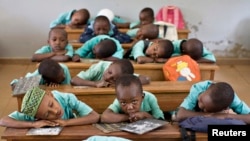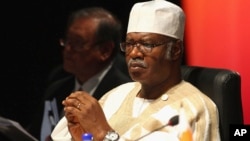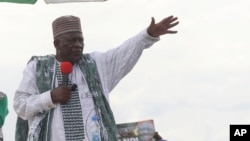Strikes intended to increase the use of English in Cameroon have extended to schools and universities after lawyers and teachers in English-speaking regions refused to call off the protests. Talks about the official use of English have been held with Prime Minister Philemon Yang, other government officials and traditional rulers.
Lawyers and teachers, supported by disgruntled youths, are engaged in running battles with the military for protesting what they call the overbearing influence of French in the country, which has English and French as its official languages.
Nothing in recent years has generated as much debate and caused as much panic among government officials as has the strike, which devolved into rioting in Cameroon's English-speaking regions.
Harmony Bogda, spokesperson for striking lawyers, says that after 72-hour-long discussions, attorneys left with an impression that the government does not want to listen. Consequently, Bogda says, the strike will continue.
"We are not going to work,” Bogda said. “He [Yang] has opened up the channel for dialogue with the government in complement with what the parliamentarians need. He has even insisted that we should approach our minister of justice, but since the minister of justice is under him, we are hoping that he will be able to deconstruct the wall the minister has built so that we can have an across-the-board dialogue for the interest of this country."
Violence: Two sides of story
Lawyer Ben Muna of the Cameroon Bar Council Association says his colleagues are also angry because security forces harassed and beat them for demonstrating peacefully.
"Any lawyer is free as a citizen to make a demand, even if it is political,” Muna said. “So that can be no excuse to ignore them. I say, it is not because they want secession that they should be vandalized and beaten. The way forward is that the minister of justice should go to Buea. Speak to them. A Cameroonian is a Cameroonian."
Communication minister and government spokesperson Issa Tchiroma says some of the requests made cannot be granted. He blames the lawyers for orchestrating the recent wave of violence in English-speaking regions.
"Those who are responsible for such abuses must know that nowhere in the world, disorder has ever led to anything constructive,” Tchiroma said. “We, therefore, call on all our compatriots to show proof of reserve, self-control, high sense of responsibility and citizenship in a spirit of dialogue."
Since running battles started with the military last Monday, schools have remained closed.
The media have been reporting that hundreds of people have been arrested and four people killed since the military used tear gas and live and rubber bullets to disperse crowds; but the governor of the northwest region of Cameroon, Adolphe Lele L'Afrique Deben Tchoffo, disputes that figure.
"It is only one person who died,” Deben Tchoffo said. “Investigations are ongoing to establish the responsibilities. I am therefore appealing to everybody to resume their normal activities and calling on those who have called the strike, that the governor has stretched his hands to them to join government to find long-lasting solutions to the problems they have raised to government."
Appeal to government
John Fru Ndi, leader of the SDF, Cameroon's main opposition political party, is urging the government to solve the problems raised by the strikers or face more rioting.
"...We can summon a big rally here in town, where we will talk to the people; but, this should be after solutions to the teething problems that the people are asking for have come in from Yaounde," he said.
English-speaking Cameroonians constitute 20 percent of the population of 22 million people. The country's constitution states that the two official languages inherited from the English and French colonial period should be given the same consideration, but many official documents are only in French. Some ministers deliver speeches only in French, even in English-speaking regions.
Nearly 60 years after independence, no English speaker in Cameroon has held any influential position such as minister of defense, finance or territorial administration.







